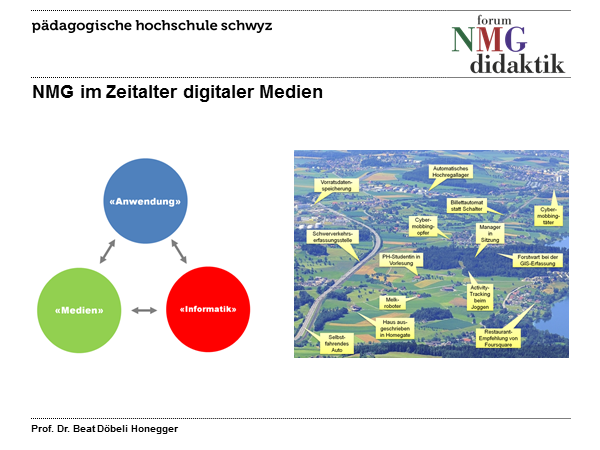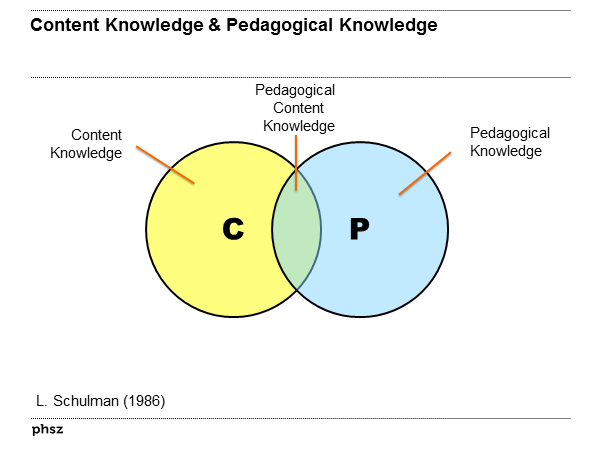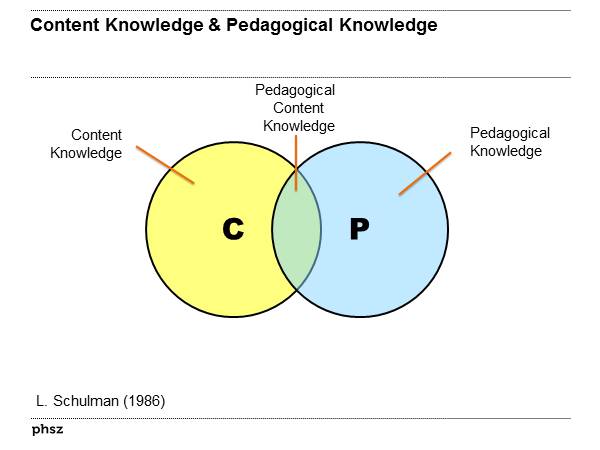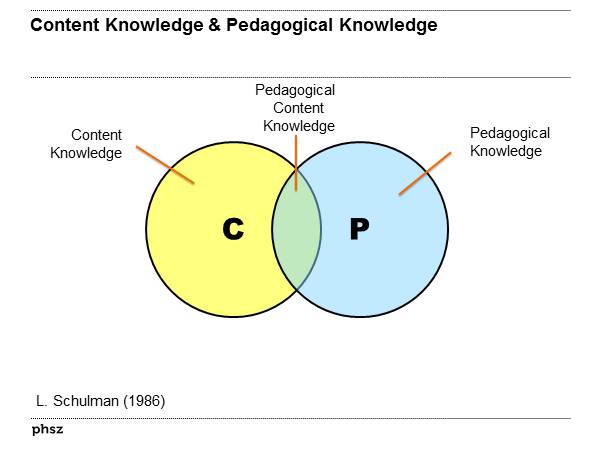Content Knowledge Content Knowledge
 BiblioMap
BiblioMap 
 Definitionen
Definitionen

 Content knowledge (CK) is knowledge about the actual subject matter that
is to be learned or taught.
Content knowledge (CK) is knowledge about the actual subject matter that
is to be learned or taught. Content Knowledge steht für die Domäne des fachspezifischen Wissens, das Lehrende für die Gestaltung ihres Unterrichts benötigen. Content Knowledge umfasst somit das Wissen der Lehrenden über den zu vermittelnden Inhalt ihres Gegenstandes, dazu gehören Konzepte, Theorien, Ideen, organisatorische Rahmenbedingungen, Beweise und Nachweise des Fachbereiches (Koehler, 2012).
Content Knowledge steht für die Domäne des fachspezifischen Wissens, das Lehrende für die Gestaltung ihres Unterrichts benötigen. Content Knowledge umfasst somit das Wissen der Lehrenden über den zu vermittelnden Inhalt ihres Gegenstandes, dazu gehören Konzepte, Theorien, Ideen, organisatorische Rahmenbedingungen, Beweise und Nachweise des Fachbereiches (Koehler, 2012). Diese Dimension umfasst Wissen über Fachinhalte, die
gelehrt und gelernt werden sollen. Hierzu gehört auch ein Verständnis zentraler
Konzepte, Theorien und Prozeduren des jeweiligen Unterrichtsfachs und
innerhalb der dazugehörigen wissenschaftlichen Disziplinen, sodass Lehrkräfte
die Herkunft des Wissens und angewandte Forschungsmethoden angemessen
bewerten können.
Diese Dimension umfasst Wissen über Fachinhalte, die
gelehrt und gelernt werden sollen. Hierzu gehört auch ein Verständnis zentraler
Konzepte, Theorien und Prozeduren des jeweiligen Unterrichtsfachs und
innerhalb der dazugehörigen wissenschaftlichen Disziplinen, sodass Lehrkräfte
die Herkunft des Wissens und angewandte Forschungsmethoden angemessen
bewerten können. Content Knowledge (CK) bezeichnet inhaltsbezogenes Wissen zum jeweiligen Fach. Dazu gehören beispielsweise neben Wissen über fachliche Begriffe, Konzepte und Theorien auch Fähigkeiten zur Nutzung von fachbezogenen Arbeitsweisen und Methoden des fachlichen Wissenserwerbs. Beispielsweise umfasst Content Knowledge im Fach Mathematik Wissen zu Funktionen, etwa Kenntnisse zu Definitionen, Beispielen, Eigenschaften, Sätzen und Beweisen, aber auch Fähigkeiten im Umgang mit Funktionen in Anwendungs- und Problemkontexten.
Content Knowledge (CK) bezeichnet inhaltsbezogenes Wissen zum jeweiligen Fach. Dazu gehören beispielsweise neben Wissen über fachliche Begriffe, Konzepte und Theorien auch Fähigkeiten zur Nutzung von fachbezogenen Arbeitsweisen und Methoden des fachlichen Wissenserwerbs. Beispielsweise umfasst Content Knowledge im Fach Mathematik Wissen zu Funktionen, etwa Kenntnisse zu Definitionen, Beispielen, Eigenschaften, Sätzen und Beweisen, aber auch Fähigkeiten im Umgang mit Funktionen in Anwendungs- und Problemkontexten.

 Content Knowledge is knowledge about the actual subject matter that is to be learned or taught,
including, for example, middle school science, high school history, undergraduate art history, or graduate
level astrophysics. Knowledge and the nature of inquiry differ greatly among content-areas and it is
critically important that teachers understand this about the subject matter that they teach. As Shulman
(1986) noted, this includes knowledge of concepts, theories, ideas, organizational frameworks, knowledge of evidence and proof, as well as established practices and approaches toward developing such knowledge.
In the case of art appreciation, such knowledge would include knowledge of art history, famous paintings,
sculptures, artists and their historical contexts, as well as knowledge of aesthetic and psychological theories
for evaluating art.
Content Knowledge is knowledge about the actual subject matter that is to be learned or taught,
including, for example, middle school science, high school history, undergraduate art history, or graduate
level astrophysics. Knowledge and the nature of inquiry differ greatly among content-areas and it is
critically important that teachers understand this about the subject matter that they teach. As Shulman
(1986) noted, this includes knowledge of concepts, theories, ideas, organizational frameworks, knowledge of evidence and proof, as well as established practices and approaches toward developing such knowledge.
In the case of art appreciation, such knowledge would include knowledge of art history, famous paintings,
sculptures, artists and their historical contexts, as well as knowledge of aesthetic and psychological theories
for evaluating art.

 Content knowledge is knowledge about the subject matter that is to be learned or taught, including, for example, middle school science, high school history, undergraduate art history, or graduate-level astrophysics. Knowledge and the nature of inquiry differ greatly among content areas, and it is critically important that teachers understand the disciplinary “habits of mind" appropriate to the subject matter that they teach. As Shulman (1986) noted, content includes knowledge of concepts, theories, ideas, organizational frameworks, methods of evidence and proof, as well as established practices and approaches toward developing such knowledge in a particular discipline. In the case of art appreciation, for example, such knowledge would include knowledge of art history, famous paintings, sculptures, the influence of artists’ historical and social contexts, as well as knowledge of aesthetic and psychological theories for understanding and evaluating art.
Content knowledge is knowledge about the subject matter that is to be learned or taught, including, for example, middle school science, high school history, undergraduate art history, or graduate-level astrophysics. Knowledge and the nature of inquiry differ greatly among content areas, and it is critically important that teachers understand the disciplinary “habits of mind" appropriate to the subject matter that they teach. As Shulman (1986) noted, content includes knowledge of concepts, theories, ideas, organizational frameworks, methods of evidence and proof, as well as established practices and approaches toward developing such knowledge in a particular discipline. In the case of art appreciation, for example, such knowledge would include knowledge of art history, famous paintings, sculptures, the influence of artists’ historical and social contexts, as well as knowledge of aesthetic and psychological theories for understanding and evaluating art. Bemerkungen
Bemerkungen

 The content to be covered in high school social
studies or algebra is very different from the content to be covered in a
graduate course on computer science or art history.
The content to be covered in high school social
studies or algebra is very different from the content to be covered in a
graduate course on computer science or art history.
 Clearly, teachers must know and understand the subjects that they teach, including knowledge of central facts, concepts, theories, and procedures within a given field; knowledge of explanatory frameworks that organize and connect ideas; and knowledge of the rules of evidence and proof (Shulman, 1986). Teachers must also understand the nature of knowledge and inquiry in different fields. For example, how is a proof in mathematics different from a historical explanation or a literary interpretation? Teachers who do not have these understandings can misrepresent those subjects to their students (Ball & McDiarmid, 1990).
Clearly, teachers must know and understand the subjects that they teach, including knowledge of central facts, concepts, theories, and procedures within a given field; knowledge of explanatory frameworks that organize and connect ideas; and knowledge of the rules of evidence and proof (Shulman, 1986). Teachers must also understand the nature of knowledge and inquiry in different fields. For example, how is a proof in mathematics different from a historical explanation or a literary interpretation? Teachers who do not have these understandings can misrepresent those subjects to their students (Ball & McDiarmid, 1990). Verwandte Objeke
Verwandte Objeke
 Verwandte Begriffe (co-word occurance) | Pedagogical Content Knowledge (PCK)Pedagogical Content Knowledge(0.66), Pedagogical KnowledgePedagogical Knowledge(0.65), Technological pedagogical content knowledge (TPCK)Technological pedagogical content knowledge(0.42), Technological Pedagogical Knowledge (TPK)Technological Pedagogical Knowledge(0.4), Technological Content Knowledge (TCK)Technological Content Knowledge(0.39), Technology KnowledgeTechnology Knowledge(0.37),  TPCK-Modell TPCK-Modell TPACK framework(0.27) TPACK framework(0.27) |
 Verwandte Aussagen | Lehrpersonen benötigen Fachwissen |
 Relevante Personen
Relevante Personen
 Häufig erwähnende Personen
Häufig erwähnende Personen
 Häufig co-zitierte Personen
Häufig co-zitierte Personen
 Punya
PunyaMishra
 Matthew J.
Matthew J.Koehler
 L.
L.Shulman
 Tae Seob
Tae SeobShin
 Sarah
SarahGretter
 Judith
JudithHarris
 Aman
AmanYadav
 Royce
RoyceKimmons
 Dale S.
Dale S.Niederhauser
 Joint Research Centre
Joint Research Centre(JRC)
 Denise L.
Denise L.Lindstrom
 Christine
ChristineRedecker
 Charles R.
Charles R.Graham
 K
KYahya
 Kristen
KristenKereluik
 Ann
AnnThompson
 Joel
JoelColbert
 Kim
KimBoyd
 Kevin
KevinClark
 Sharon
SharonGuan
 Mario
MarioKelly
 Dominik
DominikPetko
 Beat
BeatDöbeli Honegger
 Volker
VolkerFrederking
 Tamika
TamikaMcLean
 Statistisches Begriffsnetz
Statistisches Begriffsnetz 
 3 Vorträge von Beat mit Bezug
3 Vorträge von Beat mit Bezug
- NMG im Zeitalter digitaler Medien
8. NMG-Fachtagung des forums NMG didaktik
PHSZ, Goldau, 28.08.2015

- Lehren und Lernen im digitalen Zeitalter
BASPO / EHSM Magglingen, 10.03.2016

- Mehr als 0 und 1 - Lehrerausbildung im digitalen Leitmedienwechsel
50. Seminartag des Bundesarbeitskreises der Seminar- und Fachleiter/innen e.V.
Leipzig, 28.09.2016

 Zitationsgraph
Zitationsgraph
 Zitationsgraph (Beta-Test mit vis.js)
Zitationsgraph (Beta-Test mit vis.js)
 Zeitleiste
Zeitleiste
 82 Erwähnungen
82 Erwähnungen 
- Those who understand - Knowledge growth in teaching (L. Shulman) (1986)


- Knowledge and teaching - Foundations of the new reform (L. Shulman) (1987)


- Why Minimal Guidance During Instruction Does Not Work - an Analysis of the Failure of Constructivist, Discovery, Problem-Based, Experiential, and Inquiry-Based Teaching (Paul A. Kirschner, John Sweller, Richard E. Clark) (2006)


- Technological Pedagogical Content Knowledge - A Framework for Teacher Knowledge (Punya Mishra, Matthew J. Koehler) (2006)

- Tracing the development of teacher knowledge in a design seminar - Integrating content, pedagogy and technology (Matthew J. Koehler, Punya Mishra, K Yahya) (2007)
- Developing Technology Policies for Effective Classroom Practice (Glen Bull, John C. Park, Michael Searson, Ann Thompson, Punya Mishra, Matthew J. Koehler, Gerald Knezek) (2007)


- Technological Pedagogical Content Knowledge (TPCK) - Confronting the Wicked Problems of Teaching with Technology (Punya Mishra, Matthew J. Koehler) (2007)


- Teachers’ Technological Pedagogical Content Knowledge - Curriculum-based Technology Integration Reframed (Judith Harris, Punya Mishra, Matthew J. Koehler) (2007)


- Handbook of Technological Pedagogical Content Knowledge (TPCK) for Educators (Joel Colbert, Kim Boyd, Kevin Clark, Sharon Guan, Judith Harris, Mario Kelly, Ann Thompson) (2008)
- 1. Introducing TPCK - Confronting the
Wicked Problems of Teaching with Technology (Matthew J. Koehler, Punya Mishra) (2008)


- 1. Introducing TPCK - Confronting the
Wicked Problems of Teaching with Technology (Matthew J. Koehler, Punya Mishra) (2008)
- Epistemological and methodological issues for the conceptualization, development, and assessment of ICT-TPCK - Advances in technological pedagogical content knowledge (TPCK) (Charoula Angeli, Nicos Valanides) (2009)


- Teachers’ Technological Pedagogical Content Knowledge and Learning Activity Types - Curriculum-based Technology Integration Reframed (Judith Harris, Punya Mishra, Matthew J. Koehler) (2009)


- What is technological pedagogical content knowledge (TPACK)? (Matthew J. Koehler, Punya Mishra) (2009)


- SAMR and TPCK - Intro to Advanced Practice (Ruben R. Puentedura) (2010)


- ICER 2011 - Proceedings of the Seventh International Workshop on Computing Education Research, ICER 2011, Providence, RI, USA, August 8-9, 2011 (Kate Sanders, Michael E. Caspersen, Alison Clear) (2011)
- Pedagogical content knowledge in programming education for secondary school (Mara Saeli) (2011)


- Pedagogical content knowledge in programming education for secondary school (Mara Saeli) (2011)
- Digitale Medien in der Lehrerinnen- und Lehrerbildung (Dominik Petko, Beat Döbeli Honegger) (2011)



- Digitale Medien in der schweizerischen Lehrerinnen- und Lehrerbildung - Hintergründe, Ansätze und Perspektiven


- Digitale Medien in der schweizerischen Lehrerinnen- und Lehrerbildung - Hintergründe, Ansätze und Perspektiven
- Technological pedagogical content knowledge - a review of the literature (Joke Voogt, P. Fisser, Natalie Pareja Roblin, Jo Tondeur, Johan van Braak) (2012)


- Educational Technology, Teacher Knowledge, and Classroom Impact - A Research Handbook on Frameworks and Approaches (Robert N. Ronau, Christopher R. Rakes, Margaret L. Niess) (2012)

- 1. Teacher Knowledge for Teaching with Technology - A TPACK Lens (Margaret L. Niess)

- 1. Teacher Knowledge for Teaching with Technology - A TPACK Lens (Margaret L. Niess)
- Assessment in Game-Based Learning - Foundations, Innovations, and Perspectives (Dirk Ifenthaler, Deniz Eseryel, Xun Ge) (2012)
- 11. Assessing Learning Games for School Content - The TPACK-PCaRD Framework and Methodology (Aroutis Foster)


- 11. Assessing Learning Games for School Content - The TPACK-PCaRD Framework and Methodology (Aroutis Foster)
- Using technology pedagogical content knowledge development to enhance learning outcomes (Douglas D. Agyei, Jared Keengwe) (2012)


- Digitale Schule Österreich (Peter Micheuz, Anton Reiter, Gerhard Brandhofer, Martin Ebner, Barbara Sabitzer) (2013)


- Lernen! Digital. Vernetzt? - und was Sokrates, Phineas Gage und John Hattie damit zu tun haben (Gerhard Brandhofer)


- Lernen! Digital. Vernetzt? - und was Sokrates, Phineas Gage und John Hattie damit zu tun haben (Gerhard Brandhofer)
- ICER 2013 - International Computing Education Research Conference, ICER '13, La Jolla, CA, USA, August 12-14, 2013 (Beth Simon, Alison Clear, Quintin I. Cutts) (2013)
- Proceedings of the 8th Workshop in Primary and Secondary Computing Education, WiPSCE '13, Aarhus, Denmark, November 11-13, 2013 (Michael E. Caspersen, Maria Knobelsdorf, Ralf Romeike) (2013)
- PCK and reflection in computer science teacher education (Malte Buchholz, Mara Saeli, Carsten Schulte) (2013)


- PCK and reflection in computer science teacher education (Malte Buchholz, Mara Saeli, Carsten Schulte) (2013)
- Einführung in die Mediendidaktik - Lehren und Lernen mit digitalen Medien (Dominik Petko) (2014)


- Handbook of Research on Educational Communications and Technology - 4th edition (J. Michael Spector, M. David Merrill, Jan Elen, M. J. Bishop) (2014)
- 9. The Technological Pedagogical Content Knowledge Framework (Matthew J. Koehler, Punya Mishra, Kristen Kereluik, Tae Seob Shin, Charles R. Graham)


- 9. The Technological Pedagogical Content Knowledge Framework (Matthew J. Koehler, Punya Mishra, Kristen Kereluik, Tae Seob Shin, Charles R. Graham)
- ICER 2014 - International Computing Education Research Conference, ICER 2014, Glasgow, United Kingdom, August 11-13, 2014 (Quintin I. Cutts, Beth Simon, Brian Dorn) (2014)
- What pedagogical content knowledge competencies do computer science pre-service teachers have? (Melanie Margaritis) (2014)


- What pedagogical content knowledge competencies do computer science pre-service teachers have? (Melanie Margaritis) (2014)
- Examining TPACK’s Theoretical Future - Jl. of Technology and Teacher Education (2015) 23(1), 53-77 (Royce Kimmons) (2015)


- Technological Pedagogical Content Knowledge - Exploring, Developing, and Assessing TPCK (Charoula Angeli, Nicos Valanides) (2015)


- Effect of a TPCK-SRL Model on Teachers’ Pedagogical Beliefs, Self-Efficacy, and Technology-Based Lesson Design (Bracha Kramarski, Tova Michalsky) (2014)


- Effect of a TPCK-SRL Model on Teachers’ Pedagogical Beliefs, Self-Efficacy, and Technology-Based Lesson Design (Bracha Kramarski, Tova Michalsky) (2014)
- Lehr- / Lerntheorien und mediendidaktisches Handeln - Eine Studie zu den digitalen Kompetenzen von Lehrenden an Schulen (Gerhard Brandhofer) (2015)



- Mehr als 0 und 1 - Schule in einer digitalisierten Welt (Beat Döbeli Honegger) (2016)


- Lernwirksame Unterrichtsbesprechungen im Praktikum - Nutzung von Lerngelegenheiten durch Lehramtsstudierende und Unterstützungsverhalten der Praxislehrpersonen (Kathrin Futter) (2016)


- Erfolgsfaktoren für die Einführung digitaler Medien in Schulen - eine Prozessanalyse (Mina Ghomi) (2016)


- Seminar 1/2017 - Medien in Schule und Lehrerausbildung - 50. Seminartag in Leipzig (2017)

- Informatics in Schools: Focus on Learning Programming - 10th International Conference on Informatics in Schools: Situation, Evolution, and Perspectives, ISSEP 2017, Helsinki, Finland, November 13-15, 2017 (Valentina Dagiene, Arto Hellas) (2017)


- 6. Investigating Informatics Teachers´ Initial Pedagogical Content Knowledge on Modeling and Simulation (Natasa Grgurina, Erik Barendsen, Cor Suhre, Klaas van Veen, Bert Zwaneveld)


- 6. Investigating Informatics Teachers´ Initial Pedagogical Content Knowledge on Modeling and Simulation (Natasa Grgurina, Erik Barendsen, Cor Suhre, Klaas van Veen, Bert Zwaneveld)
- Handbook of Technology Education (Marc J. de Vries) (2017)


- 40. Teaching the Language of Technology: Toward a Research Agenda (Gerald van Dijk, Maaike Hajer)


- 47. Pedagogical Content Knowledge for Technology Education (Michael A. de Miranda)


- 72. Technology Teacher Education (John Ritz)


- 40. Teaching the Language of Technology: Toward a Research Agenda (Gerald van Dijk, Maaike Hajer)
- Second Handbook of Information Technology in Primary and Secondary Education (Joke Voogt, Gerald Knezek, Rhonda Christensen, Kwok-Wing Lai) (2018)


- 9. Information and Communication Technologies, and Learning Theories - Putting Pedagogy into Practice (Vanessa P. Dennen, Kerry J. Burner, Michelle L. Cates)


- 9. Information and Communication Technologies, and Learning Theories - Putting Pedagogy into Practice (Vanessa P. Dennen, Kerry J. Burner, Michelle L. Cates)
- Computer Science Education - Perspectives on Teaching and Learning in School (Sue Sentance, Erik Barendsen, Carsten Schulte) (2018)


- EdMedia 2018 (2018)
- Students’ perceptions of ICT use in higher education context (Teemu Valtonen, Erkko Sointu, Jari Kukkonen, Jenni Kankaanpää)


- Students’ perceptions of ICT use in higher education context (Teemu Valtonen, Erkko Sointu, Jari Kukkonen, Jenni Kankaanpää)
- ICER 2018 - Proceedings of the 2018 ACM Conference on International Computing Education Research, ICER 2018, Espoo, Finland, August 13-15, 2018 (Lauri Malmi, Ari Korhonen, Robert McCartney, Andrew Petersen) (2018)
- Professional Learning in the Midst of Teaching Computer Science (Aleata Hubbard, Katie D'Silva) (2018)


- Professional Learning in the Midst of Teaching Computer Science (Aleata Hubbard, Katie D'Silva) (2018)
- Informatics in Schools: Fundamentals of Computer Science and Software Engineering (Sergei Pozdniakov, Valentina Dagienė) (2018)


- Investigating the Pedagogical Content Knowledge of Teachers Attending a MOOC on Scratch Programming (Ebrahim Rahimi, Ineke Henze, Felienne Hermans, Erik Barendsen)


- Investigating the Pedagogical Content Knowledge of Teachers Attending a MOOC on Scratch Programming (Ebrahim Rahimi, Ineke Henze, Felienne Hermans, Erik Barendsen)
- Medien und Schule - Unterrichten mit Whiteboard, Smartphone und Co. (Heike Schaumburg, Doreen Prasse) (2018)


- Digitale Transformation - Beiträge zur Lehrerinnen- und Lehrerbildung 2/2018 (2018)

- Digitale Transformation in Bildung und Schule - Facetten, Entwicklungslinien und Herausforderungen für die Lehrerinnen- und Lehrerbildung (Dominik Petko, Beat Döbeli Honegger, Doreen Prasse) (2018)


- Digitale Transformation in Bildung und Schule - Facetten, Entwicklungslinien und Herausforderungen für die Lehrerinnen- und Lehrerbildung (Dominik Petko, Beat Döbeli Honegger, Doreen Prasse) (2018)
- Von TPaCK zu DPaCK - Digitalisierung im Unterricht erfordert mehr als technisches Wissen (Johannes Huwer, Thomas Irion, Sebastian Kuntze, Steffen Schaal, Christoph Thyssen) (2019)


- Medien im Unterricht (Dominik Petko) (2019)


- ITiCSE 2019 - Proceedings of the 2019 ACM Conference on Innovation and Technology in Computer Science Education, Aberdeen, Scotland, UK, July 15-17, 2019 (Bruce Scharlau, Roger McDermott, Arnold Pears, Mihaela Sabin) (2019)
- Exploring the Correlation Between Teacher Pedagogical Content Knowledge and Content Knowledge in Computer Science Classrooms (Tom McKlin, Taneisha Lee, Dana Wanzer, Brian Magerko, Doug Edwards, Sabrina Grossman, Emily Bryans, Jason Freeman) (2019)


- Exploring the Correlation Between Teacher Pedagogical Content Knowledge and Content Knowledge in Computer Science Classrooms (Tom McKlin, Taneisha Lee, Dana Wanzer, Brian Magerko, Doug Edwards, Sabrina Grossman, Emily Bryans, Jason Freeman) (2019)
- Proceedings of the 14th Workshop in Primary and Secondary Computing Education, WiPSCE 2019, Glasgow, Scotland, UK, October 23-25, 2019 (2019)
- Bewegungen - Beiträge zum 26. Kongress der Deutschen Gesellschaft für Erziehungswissenschaft (Isabell van Ackeren, Jens Brauhardt, Helmut Bremer, Fabian Kessl, Hans Christoph Koller, Nicolle Pfaff, Caroline Rotter, Dominique Klein, Ulrich Salaschek) (2020)


- Lehrer*innenbildung und Digitalisierung - Konzepte und Entwicklungsperspektiven (Birgit Eickelmann, Kerstin Drossel)

- Lehrer*innenbildung und Digitalisierung - Konzepte und Entwicklungsperspektiven (Birgit Eickelmann, Kerstin Drossel)
- Jahrbuch Medienpädagogik 17 - Lernen mit und über Medien in einer digitalen Welt (Klaus Rummler, Ilka Koppel, Sandra Aßmann, Patrick Bettinger, Karsten D. Wolf) (2020)


- ICT-Professionalisierung und ICT-Beliefs - Professionalisierung angehender Lehrpersonen in der digitalen Transformation und ihre berufsbezogenen Überzeugungen über digitale Informations- und Kommunikationstechnologien (ICT) (Robin Schmidt) (2020)


- 1. Forschungsstand: Lehren und Lernen in der digitalen Transformation
- Quo vadis TPACK? - Scouting the road ahead (Dominik Petko) (2020)


- Überzeugungen von Lehrpersonen zu digitalen Medien - Eine qualitative Untersuchung zu Entstehung, Bedingungsfaktoren und typenspezifischen Entwicklungsverläufen (Daniela Knüsel) (2020)


- DPCK statt TPCK (Beat Döbeli Honegger) (2020)


- Technology-related knowledge, skills, and attitudes of pre- and in-service teachers (Sabine Seufert, Josef Guggemos, Michael Sailer) (2021)
- Self-reported technological pedagogical content knowledge (TPACK) of pre-service teachers in relation to digital technology use in lesson plans (Mirjam Schmid, Eliana Brianza, Dominik Petko) (2021)


- Self-reported technological pedagogical content knowledge (TPACK) of pre-service teachers in relation to digital technology use in lesson plans (Mirjam Schmid, Eliana Brianza, Dominik Petko) (2021)
- 4K und digitale Kompetenzen - Chancen und Herausforderungen (Manfred Pfiffner, Saskia Sterel, Dominic Hassler) (2021)

- Programmierkompetenzen von Lehrpersonen des Zyklus 3 - Aktueller Stand der Aus- und Weiterbildung von Lehrpersonen des Zyklus 3 bezüglich persönlicher Programmierkompetenzen (Adrian Degonda) (2021)

- Digitales Lehren und Lernen (Jörg Zumbach) (2021)

- Digitalisierung in der Bildung - Bericht im Auftrag des Staatssekretariats für Bildung, Forschung und Innovation (SBFI) und der Schweizerischen Konferenz der kantonalen Erziehungsdirektoren (EDK) im Rahmen des Bildungsmonitorings (educa.ch Schweizerisches Medieninstitut für Bildung und Kultur) (2021)


- 3. Konzeptioneller Rahmen

- 3. Konzeptioneller Rahmen
- Informatik für alle - Beitrag und exemplarische Ausgestaltung informatischer Bildung als Grundlage für Bildung in der digitalen Transformation (Stefan Seegerer) (2021)


- 2. Digitale Transformation und Bildung in der digitalen Transformation

- 2. Digitale Transformation und Bildung in der digitalen Transformation
- WiPSCE '21 - The 16th Workshop in Primary and Secondary Computing Education, Virtual Event / Erlangen, Germany, October 18-20, 2021 (Marc Berges, Andraes Mühling, Michal Armoni) (2021)
- Exploring Teachers' PCK for Computational Thinking in Context (Sabiha Yeni, Natasa Grgurina, Felienne Hermans, Jos Tolboom, Erik Barendsen) (2021)


- Exploring Teachers' PCK for Computational Thinking in Context (Sabiha Yeni, Natasa Grgurina, Felienne Hermans, Jos Tolboom, Erik Barendsen) (2021)
- Beiträge zur Lehrerinnen- und Lehrerbildung 3/2021 (2021)
- Computational Thinking in Education - A Pedagogical Perspective (Aman Yadav, Ulf Dalvad Berthelsen) (2021)

- 8. Professional Development as a Bridge between Teacher Competencies and Computational Thinking Integration (Secil Caskurlu, Aman Yadav, Kyle Dunbar, Rafi Santo)
- Investigating contextual knowledge within TPACK - How has it been done empirically so far? (Eliana Brianza, Mirjam Schmid, Jo Tondeur, Dominik Petko) (2022)


- Fachliche Bildung in der digitalen Welt - Digitalisierung, Big Data und KI im Forschungsfokus von 15 Fachdidaktiken (Volker Frederking, Ralf Romeike) (2022)


- Von TPACK und DPACK zu SEPACK.digital. (Volker Frederking)

- Biologische Bildung in der digitalen Welt - Die digitale Transformation im Fokus der Biologiedidaktik (Jorge Groß, Armin Lude, Claudia Nerdel, Jürgen Paul, Steffen Schaal, hilipp Schmiemann, Christoph Thyssen)

- Von TPACK und DPACK zu SEPACK.digital. (Volker Frederking)
- Schule digital - der Länderindikator 2021 - Lehren und Lernen mit digitalen Medien in der Sekundarstufe I in Deutschland im Bundesländervergleich und im Trend seit 2017 (Ramona Lorenz, Sittipan Yotyodying, Birgit Eickelmann, Manuela Endberg) (2022)


- Digitalisierung im Bildungssystem - Handlungsempfehlungen von der Kita bis zur Hochschule - Gutachten der Ständigen Wissenschaftlichen Kommission der Kultusministerkonferenz (SWK) (SWK Ständige Wissenschaftliche Kommission der KMK) (2022)


- Einleitung

- Einleitung
- Digitale Kompetenz von Lehrpersonen für den Medien- und Informatikunterricht in der Schweiz (Marina Grgic) (2023)


- Informatikunterricht: Meh als Word, imfall! (Christina Utzinger) (2023)

- Informatikunterricht zwischen Aktualität und Zeitlosigkeit - 20. GI-Fachtagung Informatik und Schule (Lutz Hellmig, Martin Hennecke) (2023)


- WIPSCE '23 - The 18th WiPSCE Conference on Primary and Secondary Computing Education Research (Sue Sentance, Mareen Grillenberger) (2023)
- Developing a Computer Science Content Knowledge Test for 10th Grade Students (Tobias Bahr) (2023)


- Assessing Pre-Service Elementary Science Education Teachers' Professional Knowledge in the Field of Computational Thinking (Nicolas Arndt, Maja Brückmann) (2023)


- AI Education in German K-10 Computer Science Curricula (Gia Minh Vo, Nils Pancratz) (2023)


- Developing a Computer Science Content Knowledge Test for 10th Grade Students (Tobias Bahr) (2023)
- Competencies and beliefs of Swiss teachers with regard to the modular curriculum ‘Media and ICT’ (Marina Grgic) (2023)


- Digital Leadership - Schulen im digitalen Wandel führen (Tobias Röhl, Johannes Breitschaft, Eliane Burri, Nicole Wespi) (2023)


- Digital kompetente Schulorganisationen - Entwicklung von unterstützenden Organisationsstrukturen (Fanny Pettersson) (2018)

- Digital kompetente Schulorganisationen - Entwicklung von unterstützenden Organisationsstrukturen (Fanny Pettersson) (2018)
- Wie schätzen Lehramtsstudierende ihre professionelle digitale Kompetenz ein? - Eine Interventionsstudie zur Förderung der professionellen digitalen Kompetenz mit Fokus auf das Computational Thinking im Themenfeld Bildungsrobotik (Raphael Fehrmann) (2023)


- Informatics in Schools. Beyond Bits and Bytes: Nurturing Informatics Intelligence in Education - 16th International Conference on Informatics in Schools: Situation, Evolution, and Perspectives, ISSEP 2023, Lausanne, Switzerland, October 23–25, 2023 (Jean-Philippe Pellet, Gabriel Parriaux) (2023)


- What Is AI-PACK? - Outline of AI Competencies for Teaching with DPACK (Uwe Lorenz, Ralf Romeike)


- Teachers’ Knowledge in Informatics - Exploring Educational Robotics Resources Through the Lens of Textual Data Analysis (Gabriel Parriaux, Christophe Reffay, Béatrice Drot-Delange, Mehdi Khaneboubi)


- What Is AI-PACK? - Outline of AI Competencies for Teaching with DPACK (Uwe Lorenz, Ralf Romeike)
- Digitalisierung in der Lehrer:innenbildung - Corona als Katalysator?! (Julian Aufenanger, Michael Bigos) (2023)


- Digitale Kompetenzen für das Lehren und Lernen im 21. Jahrhundert (Barie Al-Masri)

- Digitale Kompetenzen für das Lehren und Lernen im 21. Jahrhundert (Barie Al-Masri)
- Gestaltungsprinzipien für den Erwerb von TPACK in der Lehrkräftebildung (Danny Dignaß) (2024)


- Förderung mediendidaktischer und informatischer Kompetenzen von Lehramtsstudierenden (Leona S. Kruse) (2024)


- TPACK in Context - An Updated Model (Dominik Petko, Punya Mishra, Matthew J Koehler) (2025)












 Biblionetz-History
Biblionetz-History